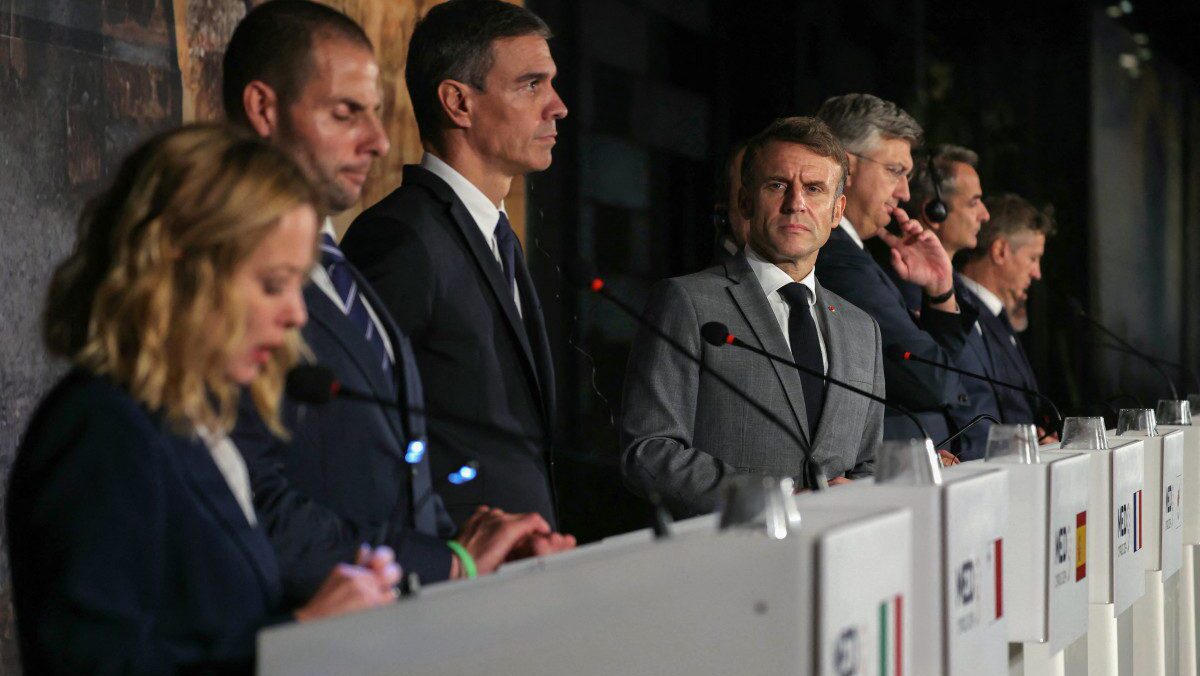
France’s President Emmanuel Macron looks at Italy’s Prime Minister Giorgia Meloni speaking during a press conference after the MED9 Summit, October 2024.
Photo: Thomas Samson / AFP
For a moment it seemed that there would be enough countries to form a blocking minority that could prevent the giant EU-Latin America free trade agreement from materializing to the detriment of Europe’s farming community, but now it seems Giorgia Meloni’s Italian government might ditch the coalition to pursue other interests.
According to unnamed insider sources cited by Politico, Rome is holding out until the last minute to make up its mind and will likely decide not to veto the Mercosur deal as its economic benefits slightly outweigh the drawbacks and Meloni seeks to leverage her vote to gain more influence in Brussels.
Being the EU’s second-biggest exporter to South America, Italy has generally been supportive of the deal for years, so Rome’s eventual approval shouldn’t come as a big surprise. However, seeing Europe’s conservative opposition mounting in recent months—largely due to the catastrophic effects the deal could have on the competitiveness of European agricultural products—the Meloni government began to question Mercosur in its current form.
This change of heart led the France-led anti-Mercosur coalition, which also involves Poland, Ireland, and Austria, to believe they could count on Italy to ultimately block the agreement, for which they need countries that represent at least 35% of the EU population.
One source—presumably a government official—with “direct knowledge” of Rome’s position, however, told Politico that Meloni is more likely to choose not to veto in exchange for certain limited concessions, such as stricter sanitary controls on imported products or EU cash grants for farmers.
While none of this would truly make up for the expected imbalance that Mercosur would create in the agricultural market, Rome has its reasons to back the deal when it comes to the vote.
A study commissioned by the Italian foreign ministry in 2020 states that Mercosur would be beneficial to the country’s long-term economic interests, which are more aligned with those of Germany—the agreement’s main proponent—primarily due to the two countries’ intertwined automotive industries.
This is frequently brought up by the centrist junior coalition partner, Forza Italia (EPP), whose leader Antonio Tajani is also serving as minister of foreign affairs and trade, and therefore, Mercosur falls into his portfolio. The other coalition partner, Matteo Salvini’s Lega (PfE), is strongly against the agreement, but it’s not enough to alone sway Meloni’s Brothers of Italy (ECR).
Interestingly, the Mercosur question not only hinges on Meloni in the EU Council but also in the European Parliament. Albeit for slightly different reasons, the two ends of the spectrum—the Greens and the Left on one side, and the Patriots and the ESN on the other—are expected to join forces against the deal, while the center-left ‘Ursula coalition’ (EPP, S&D, Renew) will mostly vote in favor of it. This leaves Meloni’s ECR group to tip the scale toward either side.
Ultimately, it will probably come down to which side can offer more to Rome, but the field is tilted in favor of the EU establishment. Meloni might not only curry personal favor with EU Commission chief Ursula von der Leyen but also secure additional concessions on unrelated legislative files from the centrist parties and further solidify ECR’s elevated position in the Brussels hierarchy.
This is one of those cases that reminds us that while principles might be central to political discourse, more often than not, it is the individual interests that shape decisions.
